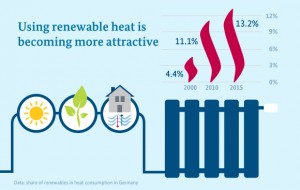In 2015 renewable energy sources such as solar thermal and biomass contributed 13.2 percent to Germany’s heat consumption. This was the highest share yet.

Renewable energies increasingly play an important role, not only in the electricity sector, but also in heating sector. Even though their percentage share in the total heat consumption is much less when compared to the one for electricity consumption, last year saw 155 TWh of heat produced by renewable energies. According to the Federal Ministry for Economic Affairs and Energy their share stood slightly higher than 13 percent of Germany’s the total heat consumption of 1176 TWh in 2015.
In a year-on-year comparison the share of renewable heat rose by 10 TWh or 6.5 percent compared to 2014. The German government intends to increase the share of renewable energy in the heat consumption to 14 percent in 2020. Possibly, this target can be reached ahead of time and industry associations call for a higher percentage for reasons of environmental protection and the aspirations of the climate conference in Paris.
The largest part of the generation of heat from renewables has been provided by biogenic energy sources, especially by wood for heating in households (61.8 TWh), further biogenic energy carriers in the industry (25.6 TWh), and by biogas and bio-methane (16 TWh).



